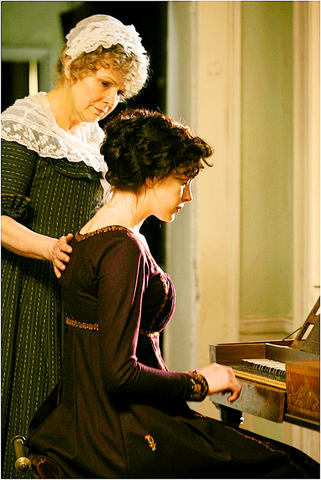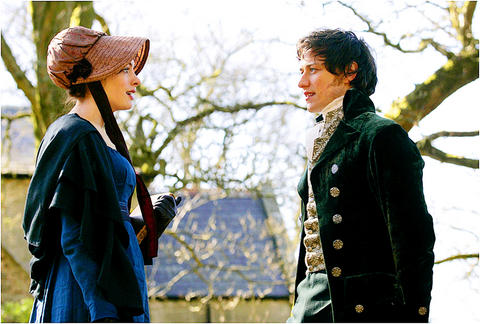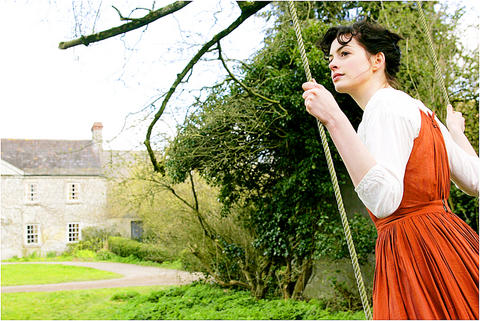How do you explain the Jane Austen bandwagon, which rolls on full steam with Becoming Jane, an imitation screen adaptation of an Austen-like novel that imagines the author's romantic life at 20? Austen's refined language, which Sarah Williams and Kevin Hood's screenplay does a reasonably good job of capturing, is part of the charm. In the age of "whatever," who doesn't relish receiving a scrupulously considered, grammatically correct answer to a question?
Austen's reassuring brand of sense and sensibility, grounded in wit and sound moral judgment, is another attraction. To literate Anglophiles, Austen and everything she represents looms as a symbolic bulwark against the values of today's babelicious Babylon. The premarital meat market of her era was reassuringly prim.
"Tainted by suspicion" is the nastiest description applied by one woman to another in this film, which plays as a fanciful, scenic (but not too opulent) prequel to Pride and Prejudice. That slur is directed at Jane by the wealthy and snobbish Lady Gresham (Maggie Smith), whose beloved nephew Mr Wisley (Laurence Fox) is dissuaded from marrying Jane after she considers, then reconsiders, eloping with her true love.

PHOTOS: COURTESY OF TA LAI
Like a modern chick-lit heroine, Jane has no interest in marrying a juiceless man, rich or poor, who has the imagination and charisma of a stick. An aspiring novelist in a rigid social order in which women of conspicuous intelligence are frowned upon, she is willing to take her chances. At its most hardheaded, the film makes clear that when Jane forfeits her best opportunity for a financially advantageous match it is no laughing matter.
These imagined Austens live in genteel poverty. Jane's father (James Cromwell) is a parish preacher, and the family's hopes for a comfortable future depend on its daughters landing rich husbands. As Jane's fussbudget mother (Julie Walters) observes, "Affection is desirable; money is absolutely indispensable."
Jane, however, is determined to marry for love or not all. When Tom Lefroy (James McAvoy), a rakish young Irish lawyer-in-training, comes along, it is him or nothing. Tom gives her a copy of Henry Fielding's History of Tom Jones, a Foundling to educate her about sex.

PHOTOS: COURTESY OF TA LAI
Austen, as we know, never married. And the movie implies that Tom was the real Mr Darcy, minus his fortune; hence, no marriage. Becoming Jane, directed by Julian Jarrold, whose previous movie was the garish comedy Kinky Boots, drives home the painfully limited options facing British women of limited means in the late-18th and early-19th centuries.
At country dances and balls, grown-ups scrutinize the behavior of blushing young women on the marriage block. Fun may be had, but the festivities are fraught with anxiety and calculation.
Becoming Jane is a triumph for Anne Hathaway, who brings to the young Jane the same jittery wide-eyed intensity she displayed in The Devil Wears Prada along with a secure British accent. She and McAvoy inject a keen intelligence into the couple's verbal jousts, along with romantic chemistry.

PHOTOS: COURTESY OF TA LAI
While Jane struggles to assert some independence, Tom squirms under the iron thumb of his humorless authoritarian uncle, Judge Langlois (Ian Richardson, in his last film role), who wields the purse strings. Everything about Jane, but especially her irony, offends this grim hanging judge, who hands out death sentences with a thunderous righteousness.
Hathaway, who is almost too pretty for the role, recalls the young Judy Garland, with her panicky stare and cherry lips. McAvoy's sexy, good-bad boy, especially in profile, resembles Bob Dylan in his early troubadour mode. With his taste for booze, bare-knuckle boxing and the occasional prostitute, Tom also suggests a whippet version of the young Albert Finney in Tom Jones.
Not much is known about the actual Austen-Lefroy relationship except that they met at a ball in 1795 around the time she had begun an early novel that was later reworked as Sense and Sensibility and that she described him in a letter to her sister, Cassandra (Anna Maxwell Martin), as "a very gentlemanlike, good-looking, pleasant young man." At a ball they apparently caused tongues to wag by sharing three dances instead of the regulation two.
The real-life Lefroy eventually married a wealthy Irish woman with whom he sired seven children and became a successful lawyer. The fanciful coda to Becoming Jane imagines a reunion between the grown-up Jane and Tom, now both slightly graying.
The screenplay's pseudo-Austen tone is so consistent that its lapses into modern romance-novel fantasy threaten to derail the film. A scene suggesting oral sex between Jane's parents is one. (Ugh!) And after Jane and Tom's first kiss, when Jane coyly inquires about her osculatory technique, you may want to howl.

June 23 to June 29 After capturing the walled city of Hsinchu on June 22, 1895, the Japanese hoped to quickly push south and seize control of Taiwan’s entire west coast — but their advance was stalled for more than a month. Not only did local Hakka fighters continue to cause them headaches, resistance forces even attempted to retake the city three times. “We had planned to occupy Anping (Tainan) and Takao (Kaohsiung) as soon as possible, but ever since we took Hsinchu, nearby bandits proclaiming to be ‘righteous people’ (義民) have been destroying train tracks and electrical cables, and gathering in villages

Dr. Y. Tony Yang, Associate Dean of Health Policy and Population Science at George Washington University, argued last week in a piece for the Taipei Times about former president Ma Ying-jeou (馬英九) leading a student delegation to the People’s Republic of China (PRC) that, “The real question is not whether Ma’s visit helps or hurts Taiwan — it is why Taiwan lacks a sophisticated, multi-track approach to one of the most complex geopolitical relationships in the world” (“Ma’s Visit, DPP’s Blind Spot,” June 18, page 8). Yang contends that the Democratic Progressive Party (DPP) has a blind spot: “By treating any

This year will go down in the history books. Taiwan faces enormous turmoil and uncertainty in the coming months. Which political parties are in a good position to handle big changes? All of the main parties are beset with challenges. Taking stock, this column examined the Taiwan People’s Party (TPP) (“Huang Kuo-chang’s choking the life out of the TPP,” May 28, page 12), the Democratic Progressive Party (DPP) (“Challenges amid choppy waters for the DPP,” June 14, page 12) and the Chinese Nationalist Party (KMT) (“KMT struggles to seize opportunities as ‘interesting times’ loom,” June 20, page 11). Times like these can

Swooping low over the banks of a Nile River tributary, an aid flight run by retired American military officers released a stream of food-stuffed sacks over a town emptied by fighting in South Sudan, a country wracked by conflict. Last week’s air drop was the latest in a controversial development — private contracting firms led by former US intelligence officers and military veterans delivering aid to some of the world’s deadliest conflict zones, in operations organized with governments that are combatants in the conflicts. The moves are roiling the global aid community, which warns of a more militarized, politicized and profit-seeking trend